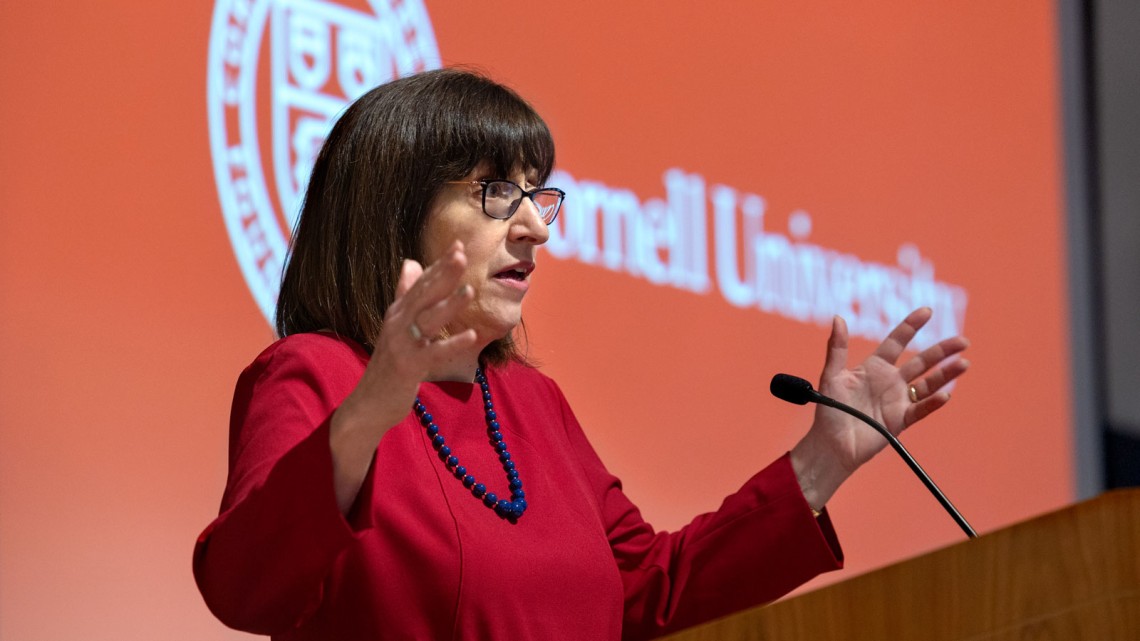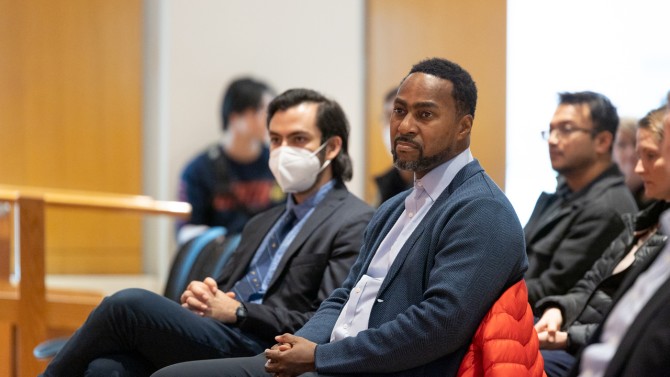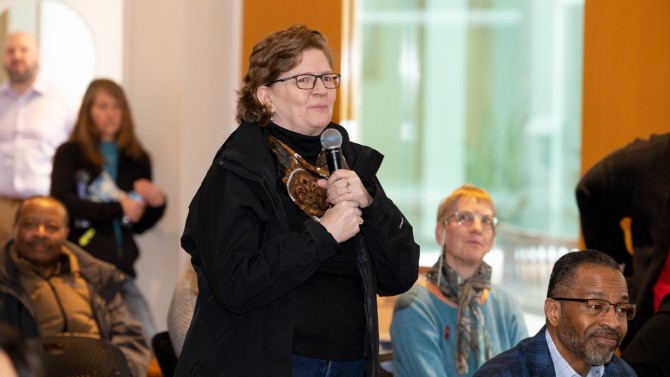
President Martha E. Pollack delivers her annual Address to Staff on Feb. 6.
Pollack lauds staff, announces mid-year bonuses
By Tom Fleischman, Cornell Chronicle
Praising Cornell’s employees for the key role they play in the university’s success, President Martha E. Pollack announced bonuses for eligible staff members as she kicked off her annual Address to Staff, held Feb 6. in G10 Biotech and over Zoom.
“Thank you all for the truly vital work that you do,” Pollack said. “Whatever your role at Cornell, each of you has played a part in the success of our academic enterprise, and I truly appreciate all of your contributions.”
Before the speech, Andrea Haenlin-Mott, chair of the Employee Assembly, announced the Employee Assembly Staff Recognition Award winners. Two organizations were honored: the Cornell University Hospital for Animals Client Experience and Service Team; and Neurodiversity @ Cornell.
Pollack launched her remarks with an announcement of an in-year bonus in the next pay deposit for all full- and part-time, regular nonbargaining-unit staff employed at Cornell since Jan. 1, 2023, earning a full-time annualized base salary of up to $99,999.
Those earning under $50,000 a year will receive a lump sum of $1,000 (subject to taxes and deductions); those earning more will receive less on a sliding scale, with a minimum bonus of $500.
Pollack said she values the annual address as an opportunity to acknowledge staff’s important contributions to Cornell.
“It’s a chance to share with you an overview of the work of the university – work in which our staff, in countless ways, play an essential role,” she said. “Our grant officers and project managers, vet techs and administrative assistants, bus drivers and custodians, extension specialists and development associates, plumbers and carpenters … every single one of you keeps our academic enterprise running smoothly – all of you are key to our success as a university.”
Pollack referred to Cornell as “the model of the modern research university: with a drive for innovation and a foundational commitment to diversity and inclusion; with world-class faculty who work at, and across, the boundaries of their fields; with exceptional students who will become capable citizens and problem-solving leaders, contributing to their communities in myriad ways; and with a talented and dedicated staff who support our work across everything we do.”
Pollack lauded the pathbreaking work of university researchers, then spoke of the colleges and schools that have recently been named at Cornell:
- the Cornell Jeb E. Brooks School of Public Policy, which celebrated its first anniversary last fall;
- the Cornell Ann S. Bowers College of Computing and Information Science, created and named in December 2020, which recently achieved the milestone of 2,000 undergraduate majors; and
- the Cornell Peter and Stephanie Nolan School of Hotel Administration, within the Cornell SC Johnson College of Business, which celebrated the first anniversary of its naming last semester.
Pollack also highlighted Cornell’s sizable presence in New York City, recognizing the 10th anniversary of Cornell Tech; the launching of the multicollege Department of Design Tech, which spans the College of Architecture, Art and Planning; the College of Human Ecology, Cornell Bowers CIS, Cornell Engineering and Cornell Tech; and the multi-institution Cardiovascular AI Initiative, launched last summer.
Pollack recognized the many nominees for the President’s Awards for Employee Excellence, whose winners were announced in a ceremony on Nov. 15, as well as the winners of the Bartels Awards, which honor the contributions of Building Care professionals and were announced Dec. 20.
The president thanked the many staff involved in the success of the ongoing “To Do the Greatest Good” philanthropic campaign, which seeks to raise $5 billion across Cornell’s campuses. A key goal of the campaign is undergraduate affordability, in keeping with the founders’ ambition of making Cornell a university for “any person.”
Pollack said current fundraising has put Cornell two-thirds of the way to its goal of $500 million, which will allow the university to: increase the number of aided students by 1,000; decrease student loans by 25%; and ensure that all aided undergraduates have the opportunity to spend at least one summer in an educational experience, rather than working to contribute to their expenses.
She then highlighted achievements in undergraduate education – including the Active Learning Initiative and the Intergroup Dialogue Project – and athletics, and reminded staff of Cornell’s ambitions to be carbon-neutral by 2035, citing the 2-mile-deep Cornell University Borehole Observatory (CUBO) as part of Cornell’s wide-ranging sustainability efforts.
In closing, Pollack expressed her appreciation to staff for their many contributions.
“Thank you – for everything you do, in so many ways,” she said, “to move our academic mission forward, and to make Cornell the wonderful university it is – a model of higher education in the 21st century.”
Pollack answered staff questions for approximately 15 minutes after her presentation. A recording of the event will be available on the Office of the Assemblies website.
Media Contact
Get Cornell news delivered right to your inbox.
Subscribe


